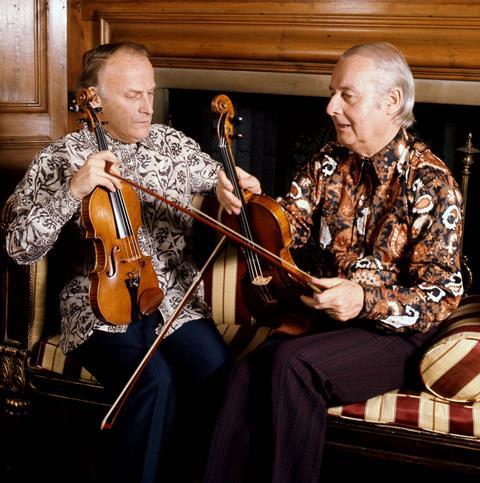Yehudi Menuhin and Stéphane Grappelli – A Captivating Performance of “Tea For Two” (1978)
In 1978, two of the most celebrated violinists in history, Yehudi Menuhin and Stéphane Grappelli, gave an unforgettable performance of the jazz standard “Tea For Two” that transcended the boundaries of both classical and jazz music. This performance was more than just a technical display of musical expertise; it was a beautiful blend of emotion, energy, and virtuosity that captured the hearts of all who heard it.
A Meeting of Musical Giants

Yehudi Menuhin, a monumental figure in classical music, was known not only for his exceptional violin technique but also for his deep expressiveness. Menuhin’s ability to bring nuance and warmth to every note was perfectly suited to the delicate, lyrical elements of “Tea For Two”, yet he brought a creative boldness to the piece that added new dimensions.
On the other hand, Stéphane Grappelli, a jazz violinist known for his lively and free-flowing playing style, infused the performance with a sense of freedom and spontaneity. Grappelli’s lighthearted touch and improvisational brilliance were the perfect counterpoint to Menuhin’s more refined approach, creating a beautiful synergy between the two. Their collaboration was a natural fusion of the structural precision of classical music and the liberating expressiveness of jazz.
The Performance: A Perfect Fusion
From the very first notes, it was clear that this performance was something special. The piece, usually associated with its cheerful and breezy melodies, was transformed under the hands of Menuhin and Grappelli into an elegant and dynamic exploration of sound. Menuhin’s violin playing was meticulous, each note imbued with clarity, but also with a surprising inventiveness that demonstrated his versatility in stepping into the world of jazz. Grappelli’s violin, in contrast, danced across the piece with a relaxed, almost playful attitude, blending smooth lines with bursts of improvisation that brought an undeniable energy to the performance.
The contrast between their styles was not only complementary but truly magical. Menuhin’s careful phrasing and emotional depth were met with Grappelli’s free, yet controlled approach, and the result was a captivating dialogue between two master violinists. Their playing wasn’t just about technique but about communication — “Tea For Two” became a conversation, one full of color, creativity, and warmth.
An Emotional and Technical Journey
Beyond the technical brilliance, “Tea For Two” was a celebration of emotion. The piece oscillated between lively, upbeat passages and more introspective, melodic moments, with each violinist bringing their own unique voice to the music. The joy and carefree nature of the piece were juxtaposed with moments of deep reflection, allowing the audience to experience the full spectrum of emotions that music can convey.
Every twist and turn of the melody, from the swinging jazz rhythms to the more soulful, classical moments, was delivered with perfect timing and connection. Menuhin and Grappelli showcased how music can bridge the divide between genres, making it a universal language that speaks directly to the heart.
A Legacy of Musical Harmony
This 1978 performance remains one of the most iconic collaborations between classical and jazz musicians. It wasn’t merely a performance of two violins playing together, but a seamless integration of two musical worlds. By combining the elegance and precision of classical music with the spontaneity and freedom of jazz, Menuhin and Grappelli demonstrated the power of music to break down genre boundaries and create something truly transcendent.
Their playing left an indelible mark on the hearts of all who were lucky enough to experience it. This performance was a perfect reminder that music, in any form, has the ability to reach across stylistic divides and touch us in ways words cannot. The fusion of technique, emotion, and pure musical joy between Menuhin and Grappelli became an unforgettable moment in the history of music, one that will be remembered and cherished for generations to come.





